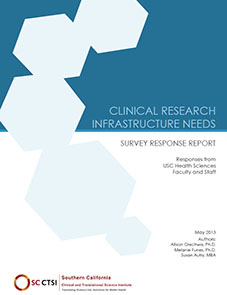SC CTSI Gathers Input From Researchers To Inform Development Of New Research Tools
The campus-wide survey initiative focused on the development of a clinical data warehouse for research and a clinical trials management system.
SC CTSI announced the results of a campus-wide survey initiative focused on the development of a clinical data warehouse for research (CDWR) and a clinical trials management system (CTMS) as well as general barriers to conducting clinical research at USC and CHLA.
More than 200 participants (63% faculty, 31% staff, as well as 5% fellows and students) from USC and CHLA provided feedback to ensure that these tools meet their research needs.
“Tools like these are essential to enhancing the impact of clinical research,” said Tom Buchanan, MD, SC CTSI director and vice dean for research at the USC Keck School of Medicine. "The challenges faced by clinical and translational researchers that we learned from the survey will inform the types of resources and services offered by SC CTSI.”
Key results include:
The biggest perceived challenges among clinical research faculty are:
- Administrative hurdles (26%),
- Funding (24%),
- Access to clinical data or specimens (21%), and
- Clinical research support staff (21%).
90% of faculty participants said that having access to clinical data from the Keck Medical Center would be useful to their research; 57% said access is critically important.
64% of faculty participants indicated that using the CDWR for historical data extraction for retrospective studies was critically important to their research. The next most highly rated purposes were health outcomes research (48%) and identification of potential participants in ongoing or planned clinical trial (42%).
Of the different types of data that could be included in a CDWR, five were rated as critically important by at least 50% of faculty:
- Demographics,
- Diagnoses,
- Procedures,
- Laboratory test results, and
- Outcomes.
The highest-rated capabilities of a CTMS, in terms of importance to faculty research, were patient management and biorepository management (44% and 40% of faculty selected critically important, respectively). The top two components according to staff were patient management and study management (63% each).
35% of faculty rated a structured biorepository as important to their research, and 38% rated it as critically important.
When asked about resources and services offered by the Southern California Clinical and Translational Science Institute (SC CTSI), over 50% of faculty rated the following as important or critically important to their research:
- Pilot funding;
- Informatics consultations; and
- Assistance in the design, conduct, and management of human studies.




